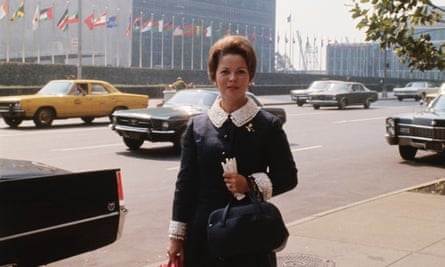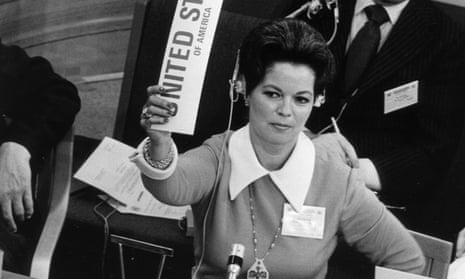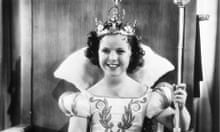Appearing on film as a safari-suited missionary being boiled in a cauldron by savages during a “cannibal-taming expedition” to Africa was not the most diplomatic debut for a future American ambassador to the region.
“Fortunately for her and the United States,” Shirley Temple-Black’s biographer Robert Windeler wrote later, the then-five-year-old’s 1933 short Kid In Africa was never shown in Ghana, where some 40 years later she would arrive as President Gerald Ford’s envoy to Accra.
It was an unexpected new role for the former child star, even after she had become active in Republican politics, run unsuccessfully for Congress in California in 1967 as a Vietnam hawk, and served as a delegate to the UN general assembly for President Richard Nixon.
She attributed the African appointment to her impressing Henry Kissinger, then national security adviser, with expertise on Namibia – which she claimed to have pointed out to him on a map – during a discussion at the White House in 1969. “I know you will do well over there,” he told her.
Professor David Apter, a Ghana specialist at Yale University, described the nomination as “a slap in the face” and “an insult to Ghana”. In the New York Times, WV Shannon accused Ford of turning the field of American ambassadorships into a “dumping ground” for political allies.
Yet soon after her December 1974 arrival in the west African state, which was led at the time by Colonel Ignatius Acheampong following a military coup, Temple-Black was dazzling her hosts and silencing her critics at home.
“She has proved herself to be a capable, wonderful person who is determined to work for the good of others,” wrote the Ghanaian Times. “Mrs Temple-Black is a charming lady, a family woman and an astute diplomat and … entirely deserves her appointment,” said the Echo, another newspaper.
She eschewed the stuffy protocol of the State Department, wandering around markets in Accra wearing traditional African prints, shouting greetings in local languages and even dancing with stall-holders. Babies were named after her by local women, according to reports at the time.
And she proved herself to be a tireless advocate for increased American aid to the country. “I am trying to assist Ghana to receive some things that it needs very badly and that I think we can manage to provide,” she told an interviewer in 1976.
Returning to Washington later that year, she became the first woman to serve as White House chief of protocol. Despite her roots in the glamorous world of Hollywood, the job was not a good fit. “A lot of parties for one who doesn’t like parties,” she recalled later.

The election of Jimmy Carter, a Democrat, at the end of that year gave her the perfect opportunity to escape. But four years later she returned to government service, working for the administration of her fellow Republican and former actor Ronald Reagan as a teacher to ambassadors and their spouses.
She longed for one more diplomatic posting, and angled publicly for South Africa, then still locked in apartheid. “I like to solve problems, and this is probably one of the biggest ones we’ve got in the world right now,” she told CNN’s Larry King in 1989, at the age of 61.
It was not to be. But while promoting her memoir later that year, she received a call from President George Bush, asking her to be his ambassador to Czechoslovakia. While other Bush nominees struggled to win confirmation by the Democrat-controlled Senate, she sailed through.
Arriving at a time of great tumult in central and eastern Europe, she watched as protesters were beaten by riot police during a 10,000-strong rally against Milos Jakes’s Communist regime in Prague’s Wenceslas Square that October, and the playwright Vaclav Havel was arrested.
By then, Temple-Black had already made a provocative intervention, channeling the country’s founders by declaring in a speech that “individual freedom could lead to a new Czechoslovakia and a more prosperous and happy existence for every one of its citizens”.
In December, the pro-democratic “velvet revolution” was complete, and Temple-Black had shown herself to be on the right side of history. Her bosses were delighted. “She’s doing a wonderful job,” said James Baker, the secretary of state. His deputy, Lawrence Eagleburger jokingly credited her with heralding “the end of the ship of state and the beginning of the Good Ship Lollipop”. She stayed on in Prague until July 1992, before finally retiring from government.
Despite her achievements in an age of male-dominated diplomacy, Temple-Black dismissed the notion that she was a feminist role model. While her appointments might have been “a manifestation of the growing recognition that women have a creative, constructive role to play”, as she said in 1976, she preferred “the strong arms of my husband around me to any women’s lib”.








Comments (…)
Sign in or create your Guardian account to join the discussion